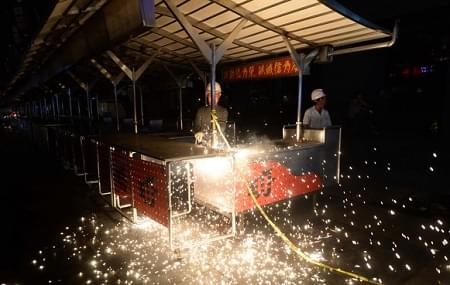
Wangfujing Night Market Closed: Beijing's Iconic Food Street Shuts Down
For years, the vibrant and bustling Wangfujing Night Market stood as a testament to Beijing's energetic street food culture, drawing locals and tourists alike with its dazzling array of culinary delights and authentic atmosphere. However, the iconic market has permanently shut down, leaving many to reminisce about its legacy and ponder the future of Beijing's night markets.
The End of an Era: Wangfujing Night Market Closes its Doors
Established in the 1980s, the Wangfujing Night Market quickly rose to prominence as a must-visit destination in Beijing. Located in a pedestrian street adjacent to the historical Wangfujing shopping area, the market offered an immersive cultural experience, with vendors hawking everything from traditional Chinese snacks to more adventurous delicacies.
The market wasn't just about the food; it was a sensory overload in the best way possible. Bright lights illuminated the stalls, the air buzzed with the sounds of sizzling skewers and lively chatter, and the aromas of exotic spices filled every corner. This unique blend of sights, sounds, and smells cemented its place as a cultural landmark and a must-do on every visitor's itinerary.
Why Did Wangfujing Night Market Close?
The news of the market's closure sent ripples through social media, with many flocking to platforms like Reddit to express their surprise and seek explanations. While no official statement has been released, several factors are cited in online discussions, mirroring common concerns associated with popular street food markets around the world.
- Hygiene Concerns: Over the years, the market faced criticism and occasional scrutiny over its hygiene standards. Ensuring consistent food safety across numerous independent vendors in such a crowded setting presents a significant challenge.
- Overcrowding and Management: The market's popularity often worked against it, with extreme overcrowding making it difficult to navigate and raising concerns about pedestrian safety.
- Disruption to Residents: Being situated in a prime location, the market's late-night operations and large crowds inevitably led to noise and disturbance for residents in the surrounding area.
A Reddit user claiming to be a former resident living near the market shared their perspective:
"Don't get me wrong, I loved the food and the energy, but living a block away was tough. The noise was constant until past midnight, and trash was a problem."
Locals and Tourists React to the Closure
The closure of Wangfujing Night Market evoked a wave of nostalgia and mixed emotions from both locals and tourists. Online platforms were abuzz with reminiscences of late-night food adventures, memorable travel experiences, and concerns about the changing face of Beijing.
Many expressed sadness over losing a place that held such cultural significance and personal memories. A tourist from Australia commented on a travel blog:
"I visited Beijing a few years ago, and Wangfujing Night Market was a highlight! It's a shame to see it go; it felt like such an authentic slice of local life."
Others acknowledged the need for progress and the challenges of balancing tradition with modern urban planning. A Beijing local commented on Weibo:
"It's sad to see it go, but I understand the reasons. Hopefully, the city will find ways to preserve and promote our street food culture in a more sustainable way."
Exploring Alternative Night Markets in Beijing
While the closure of Wangfujing Night Market marks the end of an era, Beijing is still brimming with vibrant night markets that offer a taste of authentic local cuisine and culture. Here are a few alternatives worth exploring:
| Night Market | Specialties | Location | Atmosphere |
|---|---|---|---|
| Guijie (Ghost Street) | Spicy crayfish, skewers, late-night snacks | Dongzhimen Area | Lively, boisterous, open until late |
| Niujie (Muslim Street) | Halal cuisine, lamb skewers, naan bread, yogurt drinks | Xicheng District | Cultural immersion, bustling, family-friendly |
| Shichahai (Houhai) | Barbecue, seafood, craft beer, live music | Shichahai Lake Area | Trendy, picturesque, vibrant nightlife |
The Future of Beijing's Nightlife
The closure of Wangfujing Night Market prompts reflection on the future of Beijing's nightlife and street food scene. While the city has taken steps to regulate and, in some cases, restrict street food vendors in recent years, the demand for these authentic experiences remains strong.
It's likely that Beijing's night markets will continue to evolve, potentially shifting towards a model that prioritizes food safety, crowd management, and sustainability. This may involve relocating markets to designated areas, implementing stricter vendor regulations, or promoting new night market experiences in line with modern urban planning goals.
One thing is certain: Beijing's culinary spirit is deeply ingrained in its cultural fabric. As the city adapts and finds its rhythm, new hotspots are bound to emerge, offering unique and delicious ways to experience the heart and soul of Beijing's food culture.
Frequently Asked Questions
Was Wangfujing Night Market the only one in Beijing?
No, Beijing has several other night markets, each offering a unique atmosphere and culinary experience. Guijie (Ghost Street), Niujie (Muslim Street), and Shichahai are just a few popular alternatives.
Why are some street food markets closed in Beijing?
There are various reasons, including concerns about hygiene, overcrowding, noise complaints from residents, and efforts to modernize and regulate street vending in certain areas.
Is street food in Beijing safe to eat?
As with any city, it's essential to exercise caution and choose vendors that appear clean and well-maintained. Look for places with high customer turnover, which can indicate fresh food.
More article references: beijing night market